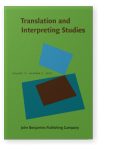Vol. 17:2 (2022) ► pp.199–219
Yinbian yanyu in twentieth-century China
A case of translaboration
The blended concept of translaboration has received considerable attention since 2015 when it was introduced by Alexa Alfer and colleagues. Yinbian yanyu [An English Poet Reciting from Afar], Lin Shu and Wei Yi’s collaborative translation of Charles and Mary Lamb’s Tales from Shakespeare, is a typical product of translaboration in twentieth-century China. Following a social historiographical path, this article seeks to identify contributions of the various stakeholders who participated in the production of Yinbian yanyu as well as its reception. By exploring what role translaboration played in the success of this translation, this article aims to present a more comprehensive view of translaboration as a concept and its applicability as an interdisciplinary tool.
Article outline
- Introduction
- The interpreter: Assistant or mentor?
- Patrons, readers, and the written translator: Heading toward an Inc.?
- The historical context and criticism: From a pound of flesh to an inch of territory?
- Conclusion
- Notes
-
References
